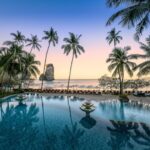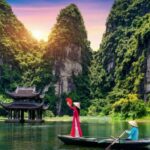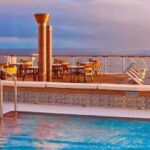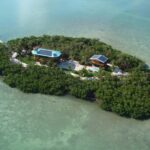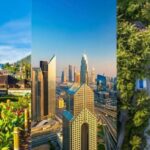Luxury Safari Tours offer an unparalleled experience, transcending the typical safari into a realm of refined comfort and exceptional wildlife encounters. Imagine waking to breathtaking sunrises over the African savanna, enjoying gourmet meals prepared by expert chefs, and embarking on thrilling game drives in meticulously maintained vehicles. This isn’t just a safari; it’s a journey of unparalleled luxury and discovery.
From meticulously planned itineraries to exclusive access to private reserves, every detail is curated to provide an unforgettable experience. The focus extends beyond simply seeing wildlife; it’s about immersing oneself in the beauty and wonder of the African landscape, while enjoying the highest standards of service and accommodation.
Defining Luxury Safari Tours
A luxury safari tour transcends the typical wildlife viewing experience, offering an unparalleled level of comfort, exclusivity, and personalized service. It’s a journey crafted to create lasting memories, emphasizing exceptional quality in every aspect, from accommodation and activities to culinary experiences and guiding expertise. The key difference lies in the meticulous attention to detail and the provision of bespoke services tailored to individual preferences.
Luxury in this context is defined by a combination of factors. It’s not simply about high prices, but rather a holistic experience encompassing superior accommodation, personalized service, exclusive access, and curated activities designed to provide a truly unforgettable safari adventure. The focus is on creating a seamless and effortless journey, allowing guests to fully immerse themselves in the beauty and wonder of the African wilderness without compromising on comfort or convenience.
Luxury Safari Amenities and Services
Luxury safari tours typically provide a range of high-end amenities and services that set them apart from standard safaris. These elements contribute significantly to the overall perception of luxury and enhance the guest experience.
Examples include staying in opulent lodges or private camps with stunning views, enjoying gourmet meals prepared by expert chefs using locally sourced ingredients, receiving personalized attention from highly experienced and knowledgeable guides, engaging in exclusive activities such as private game drives or hot air balloon safaris, and benefiting from dedicated butler service catering to every whim. Other amenities may include private plunge pools, spa treatments, and access to exclusive locations inaccessible to standard safari tours.
Comparison of Safari Tour Types
The following table illustrates the key differences between budget, mid-range, and luxury safari tours:
| Feature | Budget Safari | Mid-Range Safari | Luxury Safari |
|---|---|---|---|
| Accommodation | Basic campsites or budget lodges; shared facilities | Comfortable lodges or tented camps; private rooms, often with shared bathrooms | Opulent lodges or private camps; private villas or suites with en-suite bathrooms; exceptional decor and amenities |
| Meals | Simple, buffet-style meals | More varied meals; some à la carte options | Gourmet meals prepared by expert chefs; locally sourced, high-quality ingredients; fine dining experiences |
| Activities | Group game drives; limited activities | Group game drives; some optional activities (e.g., walking safaris) | Private game drives; exclusive activities (e.g., hot air balloon safaris, walking safaris with expert trackers); customized itineraries |
| Guides | General guides | Experienced guides | Highly experienced and knowledgeable guides; personalized attention; expert trackers |
| Transportation | Shared transport | Shared or private transport (depending on the package) | Private, luxury vehicles (e.g., Land Rovers); dedicated driver |
| Service | Basic service | Good service | Exceptional, personalized service; dedicated butler service; 24/7 concierge |
Target Audience and Market Analysis
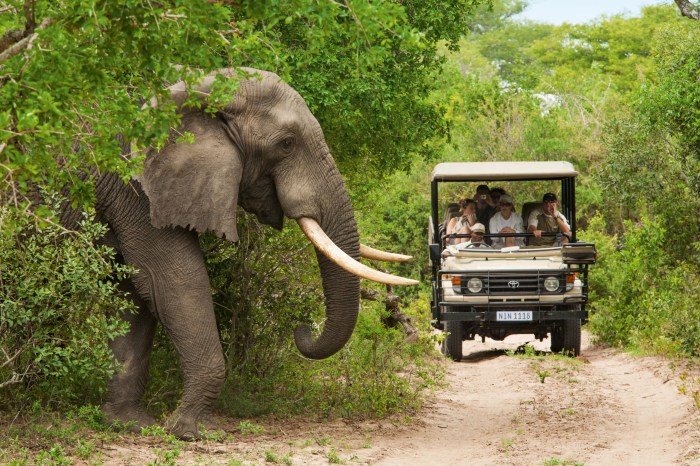
Source: cloudinary.com
Luxury safari tours cater to a discerning clientele with specific needs and preferences. Understanding this target audience is crucial for effective marketing and the overall success of the business. This analysis delves into the demographic profile, motivations, and travel preferences of this high-net-worth individual, ultimately informing the design of targeted marketing strategies.The primary demographic profile of individuals who book luxury safari tours consists of high-income earners, typically aged 45-65, with a significant disposable income and a strong interest in wildlife, nature, and adventure travel.
This group often includes couples, families, and small groups of friends seeking unique and unforgettable experiences. A significant portion also comprises experienced travelers who have already explored various destinations and seek more exclusive and personalized travel options. They value privacy, personalized service, and unparalleled access to unique wildlife encounters.
Motivations and Travel Preferences of Luxury Safari Tourists
Affluent travelers booking luxury safaris are motivated by a desire for immersive and authentic experiences. They seek more than just a sightseeing trip; they want to connect with nature, witness wildlife in its natural habitat, and contribute positively to conservation efforts. Their travel preferences often include personalized itineraries, private accommodations with exceptional amenities, and access to exclusive activities not available to the general public.
This includes private game drives in luxury vehicles, guided walks with expert trackers, hot air balloon safaris, and opportunities for intimate wildlife encounters. They value exceptional service, anticipating personalized attention to detail throughout their journey, from airport transfers to curated dining experiences.
Marketing Strategies for the High-End Safari Market
Reaching this high-end market requires a sophisticated and targeted approach. Traditional advertising methods may prove less effective; instead, a focus on digital marketing, public relations, and partnerships with luxury travel agencies and concierge services is crucial. Digital marketing should leverage high-quality photography and videography showcasing the unique experiences and luxurious accommodations offered. Content marketing, focusing on blog posts, articles, and social media content highlighting the destination, wildlife, and unique aspects of the safari experience, is essential.
Building relationships with luxury travel influencers and bloggers can also generate significant brand awareness and credibility within the target market.
Hypothetical Marketing Campaign: “Unforgettable African Encounters”
This campaign would focus on showcasing the unparalleled luxury and exclusivity of our safaris. High-quality visuals and videos depicting breathtaking landscapes, intimate wildlife encounters, and luxurious accommodations would be central to the campaign’s messaging. The campaign would be distributed across multiple channels, including targeted digital advertising on platforms frequented by affluent travelers, such as Condé Nast Traveler’s website and social media channels.
Partnerships with luxury travel agencies and concierge services would be leveraged to reach potential clients directly. The campaign’s tagline, “Unforgettable African Encounters,” would emphasize the unique and immersive nature of the safari experience, appealing to the desire for authentic and personalized travel. This campaign would also highlight the sustainable and responsible tourism practices employed, appealing to the environmentally conscious traveler.
A dedicated microsite would offer detailed information on itineraries, accommodations, and pricing, while emphasizing the personalized service and bespoke travel planning offered. This campaign would focus on building relationships with clients through personalized email marketing and exclusive offers, fostering loyalty and repeat business.
Destination and Itinerary Considerations: Luxury Safari Tours
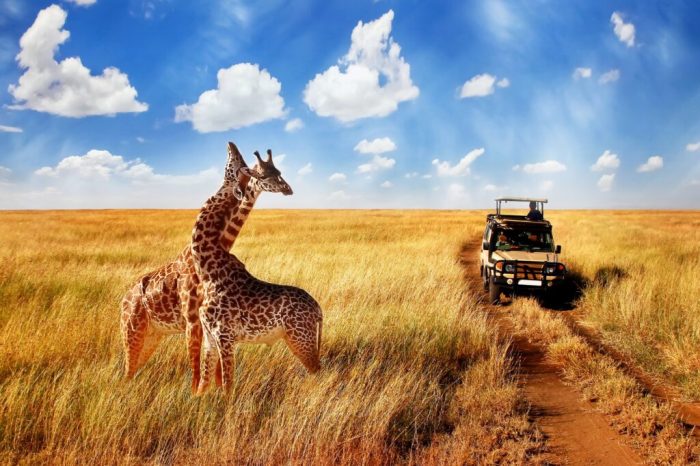
Source: smartours.com
Crafting the perfect luxury safari experience requires careful consideration of destination and itinerary. The diversity of African landscapes and wildlife populations necessitates a strategic approach to ensure a truly unforgettable journey. Choosing the right location and designing a well-paced itinerary are paramount to maximizing wildlife encounters and providing a luxurious and comfortable experience.
Popular Destinations for Luxury Safari Tours in Africa
Several regions in Africa consistently rank among the most sought-after destinations for luxury safaris. These locations offer a compelling blend of exceptional wildlife viewing opportunities, stunning landscapes, and high-quality accommodations. The choice often depends on specific wildlife interests and preferred safari style.
- Tanzania: Renowned for the Serengeti National Park, known for its Great Migration, and the Ngorongoro Crater, a unique volcanic caldera teeming with wildlife. Luxury lodges offer unparalleled comfort and service.
- Kenya: Offers iconic safari destinations like the Maasai Mara, famous for its abundant wildlife and breathtaking landscapes, and Amboseli National Park, known for its large elephant herds and views of Mount Kilimanjaro. A wide range of luxury camps and lodges are available.
- Botswana: Celebrated for its exclusive safari experiences, Botswana features the Okavango Delta, a unique inland river delta teeming with wildlife, and the Chobe National Park, known for its massive elephant herds. Luxury camps often emphasize exclusivity and personalized service.
- South Africa: Offers diverse safari experiences, from the Kruger National Park, known for its Big Five game viewing, to private game reserves offering a more exclusive and personalized safari experience. Luxury lodges and private villas cater to a range of preferences.
- Namibia: Known for its dramatic landscapes, Namibia offers unique safari experiences in Etosha National Park, renowned for its diverse wildlife and vast salt pans. Luxury lodges often focus on a blend of wildlife viewing and exploration of the stunning scenery.
Wildlife Viewing Opportunities Across Different Regions
The wildlife viewing opportunities vary significantly across different regions of Africa. Each location boasts a unique ecosystem and a specific concentration of animals. Understanding these differences is crucial in selecting the most appropriate destination for a luxury safari.
- The Great Migration (Tanzania & Kenya): Witnessing the annual migration of millions of wildebeest and zebras is a highlight for many safari-goers. Tanzania’s Serengeti and Kenya’s Maasai Mara offer prime viewing opportunities.
- Big Five Viewing (South Africa & Tanzania): South Africa’s Kruger National Park and Tanzania’s various national parks offer excellent chances to spot the Big Five (lion, elephant, leopard, rhino, and buffalo).
- Okavango Delta (Botswana): The unique ecosystem of the Okavango Delta offers exceptional opportunities to view diverse wildlife, including elephants, hippos, and various bird species.
- Ngorongoro Crater (Tanzania): The Ngorongoro Crater provides a high concentration of wildlife in a relatively small area, making for incredible viewing opportunities.
Logistical Aspects of Planning a Luxury Safari Itinerary
Planning a luxury safari itinerary involves meticulous attention to detail. Factors such as transportation, accommodation, and activities must be carefully considered to ensure a seamless and enjoyable experience.
Transportation: Luxury safaris often utilize a combination of private charter flights, 4×4 vehicles, and perhaps even hot air balloon rides to reach remote locations and maximize wildlife viewing opportunities. Private transfers ensure comfort and convenience.
Accommodation: Luxury safari lodges and camps offer exceptional comfort and service. These accommodations range from opulent tented camps to lavish lodges with private plunge pools and personalized butler service. Careful selection is crucial to align with personal preferences and budget.
Activities: Beyond game drives, luxury safaris often incorporate a range of activities, such as walking safaris, hot air balloon rides, cultural visits, and perhaps even spa treatments. The itinerary should be tailored to include a mix of activities that appeal to the traveler’s interests.
Sample 10-Day Luxury Safari Itinerary: Tanzania
This itinerary combines the best of Tanzania’s wildlife viewing opportunities with luxurious accommodations.
This itinerary focuses on Tanzania, combining the iconic Serengeti and Ngorongoro Crater with the lesser-known but equally stunning Tarangire National Park. It prioritizes luxury accommodations and a blend of game drives and cultural experiences.
- Days 1-3: Tarangire National Park: Arrive in Arusha, transfer to a luxurious lodge in Tarangire National Park. Enjoy morning and afternoon game drives, focusing on elephants and baobab trees. Consider a guided nature walk.
- Days 4-6: Serengeti National Park: Fly to the Serengeti. Stay at a luxury tented camp or lodge. Experience twice-daily game drives, focusing on the vast plains and diverse wildlife. A sunset game drive is highly recommended.
- Days 7-8: Ngorongoro Crater: Descend into the Ngorongoro Crater for a full-day game drive, marveling at the high density of wildlife within this unique ecosystem. Stay at a luxurious lodge near the crater rim.
- Days 9-10: Cultural Experience & Departure: Enjoy a cultural visit to a Maasai village, followed by a transfer to Kilimanjaro International Airport for departure. Consider a farewell dinner at a fine-dining restaurant.
Accommodation and Services
Luxury safari tours are defined not only by the wildlife encounters but also by the unparalleled comfort and service provided during the journey. The accommodation plays a crucial role in shaping the overall experience, offering a haven of relaxation and elegance amidst the breathtaking African wilderness.Luxury safari accommodations range from opulent lodges nestled within private reserves to intimate tented camps offering a more immersive bush experience.
The choice largely depends on personal preferences and the level of seclusion desired. Each option, however, strives to provide a seamless blend of comfort, luxury, and connection with nature.
Types of Luxury Safari Accommodations
Luxury safari accommodations are diverse, each offering a unique experience. Lodges typically offer a more permanent, established structure, often with multiple rooms, a central dining area, and a range of amenities. Tented camps, on the other hand, provide a more intimate and rustic feel, with individual tents offering luxurious comforts while still immersing guests in the natural surroundings.
Some high-end options even incorporate private villas or suites, providing the ultimate in exclusivity and personalized service. These variations cater to a wide spectrum of traveler preferences, ensuring there’s a perfect fit for every discerning guest.
Amenities and Services Offered by Luxury Safari Lodges
The amenities and services offered by different luxury safari lodges vary greatly, reflecting the individual character and price point of each property. Expect to find high-thread-count linens, spacious ensuite bathrooms often featuring outdoor showers, private plunge pools, and stunning views. Many lodges provide personalized butler service, gourmet dining experiences with locally sourced ingredients, curated wine lists, and exceptional game viewing opportunities led by expert guides.
Some lodges offer additional services such as spa treatments, guided nature walks, and cultural excursions, enhancing the overall safari experience beyond just game drives. The level of service is often tailored to the specific needs and preferences of the guest, resulting in a highly personalized and memorable experience.
Sustainability and Responsible Tourism in Luxury Safari Accommodations
Sustainability and responsible tourism are increasingly important considerations for luxury safari accommodations. Many lodges and camps actively participate in conservation efforts, supporting local communities, and minimizing their environmental impact. This includes using renewable energy sources, implementing water conservation measures, employing locally sourced materials in construction, and engaging in responsible waste management practices. Eco-friendly practices are not just a trend; they are a crucial element of maintaining the integrity of the natural environment and ensuring the long-term viability of the safari industry.
Choosing a lodge committed to sustainability ensures that your luxurious safari experience contributes positively to the preservation of Africa’s incredible wildlife and landscapes.
Description of a Fictional Luxury Safari Lodge: “The Stargazer’s Retreat”
Nestled in the heart of the Maasai Mara, The Stargazer’s Retreat offers an unparalleled safari experience. Each of its eight exquisitely designed suites boasts a private veranda with panoramic views of the sprawling savannah, ensuring breathtaking sunrises and unforgettable stargazing experiences. The lodge features a stunning infinity pool overlooking the watering hole, a haven of tranquility where guests can unwind after an exhilarating game drive.
Our dedicated team provides personalized service, from arranging private bush dinners under the African sky to curating bespoke wildlife viewing experiences. The lodge also emphasizes sustainability, using solar power and employing local artisans for its unique décor.
Our commitment to exceptional service and sustainable practices ensures an unforgettable and responsible luxury safari experience.
Wildlife Viewing and Activities
Luxury safari tours offer unparalleled opportunities to witness Africa’s incredible wildlife in their natural habitat. The experience is meticulously crafted to ensure comfort, safety, and maximum wildlife viewing opportunities, going beyond a simple game drive. The combination of expert guidance, comfortable vehicles, and exclusive activities creates a truly memorable journey.
Safari Vehicle Options and Their Advantages
The choice of safari vehicle significantly impacts the overall safari experience. Different vehicles cater to various preferences and offer unique advantages. Open-topped 4×4 vehicles, for example, provide excellent visibility and allow for unobstructed photography. Their maneuverability in challenging terrain ensures access to remote areas where wildlife is often more abundant. Closed vehicles, while offering protection from the elements and potentially more comfortable seating, may slightly limit viewing angles.
Some luxury tours even incorporate customized vehicles with enhanced features like panoramic sunroofs and comfortable seating arrangements for a superior viewing experience. The selection often depends on the specific itinerary and the preferences of the guests.
The Crucial Role of Experienced Guides
Experienced and knowledgeable guides are the cornerstone of a successful luxury safari. Their expertise goes beyond simply identifying animals; they possess an intimate understanding of animal behavior, tracking skills, and the local ecosystem. A skilled guide can anticipate animal movements, interpret subtle signs, and create opportunities for exceptional wildlife encounters. Their insightful commentary adds depth and context to the experience, enriching the understanding and appreciation of the wildlife and its environment.
They ensure the safety and comfort of guests while fostering a respectful and responsible approach to wildlife viewing. For instance, a guide might explain the intricate social dynamics of a lion pride or the migratory patterns of elephants, transforming a simple sighting into a compelling narrative.
Unique and Exclusive Safari Activities
Beyond traditional game drives, luxury safari tours often incorporate unique and exclusive activities designed to elevate the experience. Hot air balloon safaris, for instance, offer breathtaking panoramic views of the African landscape and wildlife from a unique perspective. The quiet ascent and descent allow for intimate encounters with animals undisturbed by the noise of a vehicle. Walking safaris, guided by expert trackers, provide an immersive and intimate experience, allowing guests to connect with the environment on a deeper level.
Other exclusive options might include night game drives, offering a different perspective on nocturnal wildlife, or specialized photographic safaris led by professional photographers who provide expert guidance on capturing stunning images. These exclusive additions transform the safari from a simple wildlife viewing experience into a truly luxurious and unforgettable adventure.
Pricing and Value Proposition
Pricing a luxury safari tour requires a careful balancing act, considering numerous factors to ensure both profitability and attractiveness to discerning clients. The ultimate price reflects a complex interplay of operational costs, desired profit margins, and the overall perceived value offered.Factors influencing pricing are multifaceted. Direct costs, such as accommodation, park fees, guide services, transportation (often including private charter flights), and meals, form the foundation.
Indirect costs, including marketing and administrative expenses, insurance, and potential contingency funds for unforeseen circumstances, add to the overall expenditure. The level of exclusivity, the specific itinerary, and the time of year (peak seasons command higher prices) also play significant roles. Furthermore, the inclusion of bespoke services, such as private chefs, specialized guides (e.g., birdwatching experts), or personalized itineraries tailored to individual preferences, will naturally elevate the cost.
Finally, currency fluctuations and inflation further complicate pricing strategies.
Pricing Comparisons with Other High-End Travel Experiences
Luxury safari tours occupy a unique niche within the high-end travel market. While comparable in price to other premium travel experiences like private yacht charters or stays in exclusive resorts, the safari offers an unparalleled combination of adventure, wildlife encounters, and immersion in unique natural environments. The overall cost might appear higher than a luxury cruise or a stay at a five-star hotel, but the exclusivity, the curated experiences, and the transformative nature of the safari journey justify the investment.
For example, a week-long luxury cruise might cost $10,000-$20,000 per person, while a comparable luxury safari could fall within a similar range or even exceed it, depending on the level of customization and chosen destination. The added value of the safari experience—wildlife encounters, breathtaking landscapes, and the thrill of adventure—offsets the price difference for many travellers.
Value Proposition of a Luxury Safari Tour
The value proposition of a luxury safari transcends mere cost; it’s about delivering an unforgettable and transformative experience. It’s about creating memories that last a lifetime, offering unparalleled access to incredible wildlife, and providing a level of service and comfort that surpasses expectations. The investment delivers more than just a holiday; it’s an investment in creating memories, enriching personal experiences, and gaining a deeper understanding of the natural world.
This value proposition is further enhanced by the expertise of highly trained guides, the use of luxurious and comfortable accommodations, and the meticulous attention to detail in every aspect of the journey. The focus is on personalization and providing bespoke services that cater to the individual preferences and desires of each guest.
Cost Breakdown of a Sample Luxury Safari Tour
The following table illustrates a sample cost breakdown for a 7-day luxury safari tour for two people in Tanzania:
| Item | Cost (USD) | Item | Cost (USD) |
|---|---|---|---|
| Accommodation (Luxury Lodge) | 8,000 | Park Fees & Permits | 1,500 |
| Private Guide & Vehicle | 4,000 | Internal Flights | 1,000 |
| Meals & Drinks | 2,000 | Activities (Hot Air Balloon, etc.) | 1,000 |
| Tips & Gratuities | 500 | Miscellaneous Expenses | 500 |
Sustainability and Responsible Tourism
The burgeoning popularity of safari tourism presents a double-edged sword. While it offers economic opportunities for local communities and raises awareness about wildlife conservation, it also carries the potential for significant environmental damage. The impact of increased tourist traffic on fragile ecosystems, including habitat destruction, pollution, and disturbance to wildlife, necessitates a proactive and responsible approach to safari operations.
Luxury safari operators, in particular, have a crucial role to play in mitigating these negative effects and promoting sustainable tourism practices.Luxury safari operators are uniquely positioned to lead the charge in sustainable tourism. Their clientele often values ethical and environmentally conscious travel, creating a receptive market for sustainable initiatives. Furthermore, their financial resources allow for the implementation of robust environmental programs and the adoption of cutting-edge technologies that minimize the ecological footprint of their operations.
By prioritizing sustainability, luxury operators not only protect the environment but also enhance their brand image and appeal to a growing segment of discerning travelers.
Environmental Impact Mitigation Strategies
Luxury safari lodges employ various strategies to minimize their environmental impact. These range from the implementation of renewable energy sources, such as solar power, to reduce reliance on fossil fuels, to the careful management of water resources through efficient irrigation systems and rainwater harvesting. Waste management programs, including composting and recycling initiatives, are crucial in reducing landfill waste and minimizing pollution.
Furthermore, many lodges actively participate in carbon offsetting programs to compensate for unavoidable emissions. For example, a lodge in Botswana might invest in reforestation projects in the region to neutralize its carbon footprint. Another lodge in Tanzania might partner with local communities to implement sustainable agricultural practices, reducing deforestation and promoting biodiversity.
Wildlife Conservation Initiatives, Luxury Safari Tours
Beyond minimizing their direct environmental impact, luxury safari operators actively contribute to wildlife conservation efforts. Many lodges support anti-poaching initiatives, often collaborating with local rangers and law enforcement agencies to protect endangered species. Some lodges actively participate in wildlife research projects, providing funding and logistical support to scientists studying animal behavior and population dynamics. This data is crucial for effective conservation management.
For instance, a lodge in Kenya might fund research on elephant migration patterns, providing valuable insights for habitat protection. Another lodge in South Africa might support a rhino monitoring program, helping to combat poaching and ensure the survival of this endangered species.
Traveler Contributions to Responsible Tourism
Travelers can significantly contribute to responsible tourism by making conscious choices. Selecting a luxury safari operator with a demonstrably strong commitment to sustainability is a crucial first step. This includes researching the operator’s environmental policies, their community engagement programs, and their contributions to wildlife conservation. During their safari, travelers can minimize their impact by following the lodge’s guidelines on waste disposal, water conservation, and wildlife viewing etiquette.
Respecting wildlife by maintaining a safe distance and avoiding disruptive behaviors is paramount. Supporting local communities by purchasing locally made crafts and engaging with local businesses further contributes to responsible tourism. For example, choosing to buy souvenirs from local artisans rather than mass-produced items directly supports the local economy and promotes sustainable livelihoods.
Final Review
Ultimately, a luxury safari tour is more than just a vacation; it’s an investment in an extraordinary experience. It’s a chance to connect with nature on a deeper level, witness the raw beauty of the African wilderness, and create memories that will last a lifetime. The meticulous planning, personalized service, and unparalleled access to wildlife and breathtaking landscapes ensure that a luxury safari delivers exceptional value and an unforgettable adventure.
FAQ Overview
What is the best time of year to go on a luxury safari?
The best time varies by location and desired wildlife viewing. Generally, the dry season (June-October) offers the best game viewing as animals congregate around water sources. However, the shoulder seasons (April-May and September-November) can offer a balance of good wildlife viewing and fewer crowds.
How much does a luxury safari cost?
Prices vary greatly depending on the duration, destination, level of luxury, and specific inclusions. Expect to pay significantly more than a standard safari, with costs ranging from several thousand to tens of thousands of dollars per person.
What are the health precautions I should take before a luxury safari?
Consult your doctor about necessary vaccinations and malaria prophylaxis. Pack insect repellent, sunscreen, and a first-aid kit. Stay hydrated and be mindful of food and water safety.
Are luxury safaris suitable for families with children?
Many luxury safari lodges cater to families, offering child-friendly amenities and activities. However, it’s crucial to check with the specific lodge regarding age restrictions and suitability for younger children.
